#good omens s2 analysis
Text
Thanks to this post documenting every miracle sound in good omens, I realized upon the latest rewatch that it sounds almost like Crowley does a miracle here when he takes off his sunglasses. Has anyone else written about this yet? Does he do a miracle on Jim here that causes the Gabriel channeling of God’s line from Job? If Crowley can miracle Jimbriel into remembering why doesn’t he do it at any other times?? WHAT DOES IT MEAN??
(Apologies for the quality of the video I have no tech skills)
#good omens meta#good omens#good omens s2#good omens 2 spoilers#good omens s2 analysis#Crowley#good omens miracles#good omens theory
128 notes
·
View notes
Text
ok i know everyone's analyzed the shit out of the Job minisode. but i think everyone has overlooked this Very Important detail, and it's this:
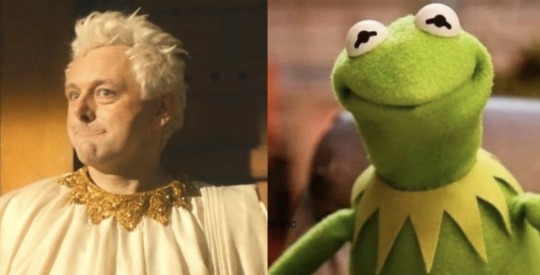
do you see it?
golden kermit collar
thank you for listening
#good omens#good omens s2#good omens 2#good omens meta#good omens analysis#aziraphale#aziraphale good omens#good omens aziraphale#good omens theory#ineffable husbands#ineffable idiots#ineffable lovers#ineffable partners#aziracrow#crowley#aziraphale x crowley#crowley x arizaphale#air conditioning#good omens shitpost#good omemes#good omens memes#xanshitposts
6K notes
·
View notes
Text
Ok so I know I posted the whole set, but I keep coming back to this particular moment-

Because look at this whole situation. Aziraphale steps forward, directly into Crowley’s shadow. Not only is he getting closer, right into his personal space, but suddenly Crowley's face is going to be a lot clearer, not backlit anymore. At the same time the Crowley's hand retreats just a little from almost grabbing and dragging Aziraphale's cravat to doing a pointy finger. And then we have-

Where the eye contact is basically the most indecent thing I've ever seen. It's just... a lot.
#i'll see myself out#good omens#good omens s2#the resurrectionists#ineffable husbands#gif analysis#gif set#aziracrow#goomens#crowley x aziraphale#i am so unwell over them#a duck gifs#a duck talks
3K notes
·
View notes
Text
I don’t think we talk enough about how the head demons used to be Crowley’s friend group up in Heaven. I really desperately want to know more about “Lucifer and the guys.” I want to know about him piggybacking around with Furfur and how he and Beelzebub used to tell scary stories to cherubs.
I want to know what happened after The Fall. Did they drift apart slowly? Did it start before that? Did it happen all at once? Did he tell them he never wanted this? When did the people he once thought to be his friends start dragging him down to Hell for punishment? When did Lucifer begin to terrify him? When did Beelzebub? Were Hastur and Ligur a part of that group? When did they decide he wasn’t worth trusting? When did he start to dread the next time they would meet? Did the loneliness set in gradually or did he realize with a start that he was all alone?
The more I think about the differences between the Crowley that we know and the Angel we met in the season 2 opener, the more tragic it becomes. They used to be his friends.
#good omens#good omens season 2#ineffable fandom#good omens s2#ineffable husbands#good omens spoilers#anthony j crowley#pre fall crowley#angel crowley#aj crowley#good omens analysis
5K notes
·
View notes
Text
The fact that Crowley grabs Aziraphale's lapels the same way in season 2 as he did in season 1 shows how that action was always meant as an intimate gesture by him. It meant intimacy to Crowley back then, and it means intimacy now.
We're talking about a deliberate acting choice from David, here. He chose to grab Michael that way in episode 6 for a reason. He's creating a connection to season 1, bridging two separate moments in the characters' relationship with a single gesture.

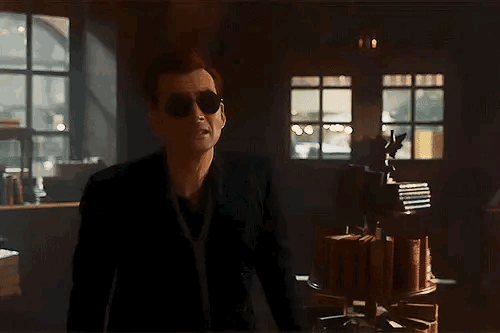
Crowley and Aziraphale have loved each other for a long, long time. They were never able to say or act on it before. But they both knew the meaning behind every little touch, every look, every lapel grab.
Yes, they both knew it. Aziraphale didn't feel threatened the first time it happened. Well, he certainly doesn't feel threatened now, either. Look at how he lets himself get dragged into the kiss. The amount of trust between these two! He's leaning in even before he realises where Crowley is dragging him (towards those gorgeous lips, of course).
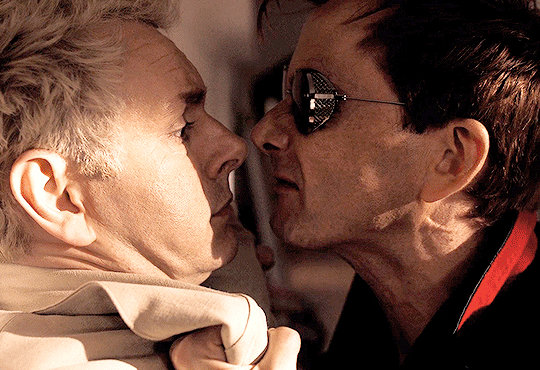
It gets worse... Neil knows precisely how much we've treasured that scene from season 1 since it aired, so he decided to use it against us.
Absolute genius!
...Evil.
.......but still genius!
#good omens#ineffable divorce#analysis#aziracrow#crowly x aziraphale#crowley#david tennant#michael sheen#aziraphale#good omens s2#go s2e6#go season 2#go s2#good omens kiss#i will sink with this ship#ineffable husbands
2K notes
·
View notes
Text
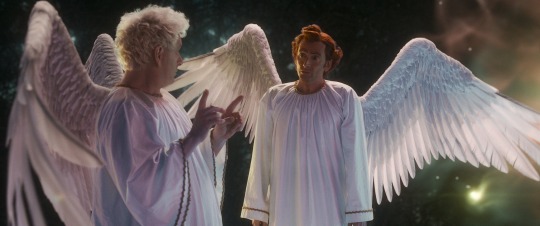
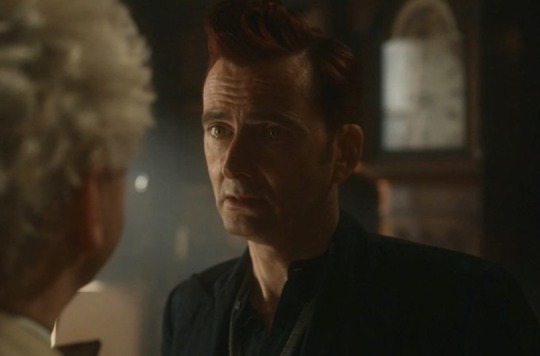
Both the opening scene and “Every” share a small theme/musical melody that creates a deep emotion context to the pairs inner feelings.
Listen below to how the notes ascend and descend:
Pre-Fall Crowley’s still has an angelic choir, a holy radiance and innocence we haven’t heard associated with him before. The theme sweeps into a bright major as he laughs at the joy of his hard work and the birth of something bright and new.
However, Crowley making a nebula fills him with the same joy as a kiss with Aziraphale. The melody plays in dramatic strings that cry out with a smaller choir which slowly drags away. A melodic interpretation of the fallen angel. Yet, the music falls to minor after the initial hope of the kiss. Sadder. Slowly falling apart.
This isn’t a birth of something new like his joyful nebula, but potentially a loss.
In conclusion: Season 2 is actively slowly killing me. David Arnold went insane this season.
More GO Analyses:
- The Metatron is a Parallel to Original Sin/the Serpent of Eden
#good omens spoilers#good omens#good omens s2#good omens 2#crowley x aziraphale#aziracrow#good omens analysis#good omens 2 analysis#GO 2#pre fall crowley#every#music analysis
5K notes
·
View notes
Text
Do you want to know what keeps me up at night?
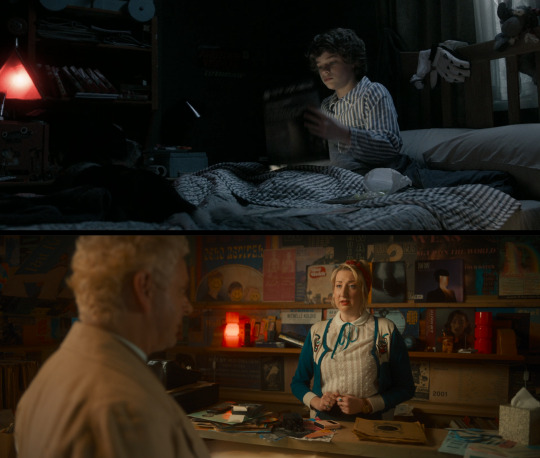
That one red light on the left.
#good omens meta#good omens 2#good omens season 2#art director talks good omens#crowley x aziraphale#good omens#good omens analysis#good omens s2#maggie
2K notes
·
View notes
Text
Becoming Real
Recently Good Omens Prime Twitter account posted a BTS photo of Aziraphale and Furfur and it started the gears in my head turning, trying to parse it. It's only just now that it finally coalesced into a proper thought.
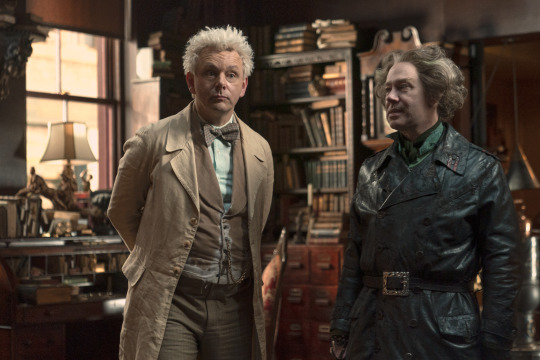
I kept thinking Aziraphale reminded me of something, especially when compared to the other angels. Look at him next to pre-Jim Gabriel, Uriel, Michael... heck, even Furfur, who he's standing next to right now.
Furfur is a demon, but his outfit is impeccable, it's sleek and stylish. The angel's suits in heaven are all pressed and flawless and New.
But not Aziraphale. He's dressed in old human clothes, his waistcoat is worn and tattered and long-loved. Aziraphale is, as Michael put it, like an old sofa. Worn and comfortable. He could choose to look basically however he wants, but instead he chooses to clothe himself in actual human clothes, to eat human food, to enjoy human entertainment - books, music, plays, etc. He does this despite the fact that it actively makes the other angels dislike him and find him unpalatable.
And that's what stuck out to me. Because unlike those other angels and demons, Aziraphale doesn't feel distant from humanity. He might be odd or eccentric to humans, but they don't question his humanity. He doesn't stand out to them in the way that the other angels do when they show up.
It occurred to me that this is because unlike the other angels... Aziraphale is Real.
Have you ever read The Velveteen Rabbit? There's a scene in it where they talk about what it means to be Real:

This made me think of Aziraphale. About how the other angels are these pristine things, kept aloof from the world, and then there's Aziraphale, who is worn and shabby, who's lived on earth for millennia among the humans. He's loved and learned and experienced what being human is like and because of that he's Real in a way that the other angels aren't. Humans have personhood, a sense of agency, a sense of self. Angels and demons have only the divine plan, as Beelzebub and Gabriel noted, that's all they live for "if you can call it living".
But what strikes me the most is how potentially devastating Aziraphale's Realness will be to Heaven. They only succeed at keeping angels in line because they're undistracted from the Great Plan. We see how Gabriel - as Jim - takes to cocoa after trying it. We see how quickly Muriel becomes fascinated with books.
Now consider that this is the angel they're putting in charge of Heaven. This worn, shabby, old sofa of an angel who has an endless well of love, for Crowley, for the world and the humans in it. He doesn't seem dangerous in the slightest. He seems Fragile.
But he is dangerous. So very dangerous.
But it's not because he's a guardian, not because he's a warrior, not because he's the Angel of the Eastern Gate who leads a battalion and was issued a flaming sword. He gave all of that away and it's worth noting that this is the first actual choice we see him make in the show, the thing that sets him apart in Crowley's eyes, and it wasn't even Crowley's doing! Aziraphale made a choice to give the mortals his sword out of compassion and it is a sense of compassion we don't see from the other angels.
His deviations all stem from that initial act. It takes him from being this two-dimensional cardboard entity existing only as part of the Divine Plan and set him on the path to actual Personhood.
It doesn't happen right away, of course, because as the Skin Horse says:
"It doesn't happen all at once. You become. It takes a long time. That's why it doesn't happen often to people who break easily, or have sharp edges, or who have to be carefully kept. Generally by the time you are Real, most of your hair has been loved off, and your eyes drop out and you get loose in the joints and very shabby. But those things don't matter at all, because once you are Real you can't be ugly, except to people who don't understand."
And doesn't that sum up Aziraphale? He's shabby and worn and he's beautiful to the people who understand and appreciate that being Real means being imperfect, and that every imperfection is still beautiful.
No wonder the angels mock his corporation, his flaws, all the things he enjoys that make him less than what they think he should be. We see evidence over and over that Aziraphale is essentially "ugly" to them. But that's because they don't understand.
Aziraphale's Realness, his personhood, what Crowley has helped nurture from the Wall of Eden all the way to that last desperate kiss, is what really matters. Good Omens has always been about People being fundamentally People. It's the underlying current that ties everything together, for good or for ill. People have agency. People have self-actualization. People have the ability to make their own choices, for good or for evil.
And now Aziraphale has that too.
That's the very real danger he presents to heaven.
Because we've already seen that any angel, given sufficient time and interaction with humans could be like Aziraphale. All it takes is one small opening, one bite from the apple. Whether deliberately or not, Crowley tempted Aziraphale into every step, the way he tempted Eve in the garden. He gave Aziraphale the knowledge of Right and Wrong, presented him with the option, the way he did with humanity. Were they even really human before Crowley? Did he give them free will? His actions cast them out of paradise, but did it ultimately set them free? Has he struggled for millennia to do the same for the angel he's loved so well and for so long?
Does Crowley know how horribly, wonderfully well he succeeded?
Bringing Aziraphale back to Heaven, putting him in charge, was the absolute worst thing the Metatron could have done for keeping the status quo and it's not because of Aziraphale's fighting prowess. It's because of the small Human acts of kindness and pettiness that Aziraphale is capable of. That's not going to go away when he's in Heaven. It's going to spread. He's going to infect Heaven with Humanity. It's going to be so slow and gradual that they won't see it coming until it's far too late.
It's not going to be the way that Aziraphale intends to change Heaven and yet, it will surely ultimately be what really makes a difference.
I wonder too, if maybe that's some subconscious part of it. After seeing Gabriel change, seeing Muriel change, I wonder if there's not some part of Aziraphale that realizes that Heaven is a miserable place that makes miserable people. He'll extend compassion to them that they don't deserve and don't know they're missing and he'll surely go on with whatever his own Plan - with a capital P, of course - is and he won't even realize what he's actually done.
And then, like the ending of S1, like the ending of S2, the ultimate deciding factor will not be who is the best warrior, who is the strongest. It will be about the Human element.
Metatron thought he could control Aziraphale, bring him in line by bringing him back to Heaven. He wants to take away the human element of Aziraphale and shove him back into that Obedient Little Angel shaped mold and he doesn't realize it's not possible anymore. Aziraphale's grown. He'll never fit, he'll never be that again. There is no going back anymore.
As the Skin Horse says: "Once you are Real, you can't become unreal again. It lasts for always."
And Real things, things with depth and purpose and will, are impossible to ever truly control.
#Good Omens#Aziraphale#good omens meta#good omens s2#crowley#crowley x arizaphale#Analysis#the velveteen rabbit#what it means to be Real
2K notes
·
View notes
Text
They mirrored the Job story
I don’t know if this has been said yet, but during the Job episode I was extremely preoccupied with the “sounds lonely” arc, preoccupied with Aziraphale changing, but I noticed something else.
There is something about that scene in the villa, where Aziraphale asks Crowley not to destroy Job’s children. Now, we know Crowley never had any plans to do this, so why would he lie to Aziraphale instead of just admitting it? Does he actually want to seem that demonic to him, does he want him to think he’s evil?
I don’t think so. At least, that isn’t the way I interpreted it.
I think Crowley was testing Aziraphale’s faith in him. He looks him in the eyes, he tells him he’s going to go through with it, and he watches his reaction. Aziraphale is on the verge of tears when he walks away, and when Crowley goes the opposite direction, you can see he looks a little disappointed.
Then Aziraphale finds out he didn’t kill the goats. And like that, his faith in him is restored.
So what does Crowley do? Just like God with Job, he escalates. He raises the stakes.
Next time, it’s the fire. The “are you sure, angel?” gets me every single time. He is looking Aziraphale in the eyes and asking for his faith, and Aziraphale looks back at him and this time, he gives it resolutely, firmly. Quite sure. And after that, Crowley doesn’t test him again.
It’s just so interesting to think about the state of their relationship at this point—the fact that Crowley is, relative to the rest of their existence, newly fallen. They’re treading this new ground, and Crowley doesn’t know where he stands in Aziraphale’s eyes. So in his own weird, definitely-not-trauma-fueled way, he decided to find out.
#good omens#ineffable husbands#crowley#aziraphale#aziracrow#good omens season 2#go2 spoilers#analysis#good omens 2#john finnemore#neil gaiman#good omens meta#s2 e2
952 notes
·
View notes
Text
Thoughts on Angel Crowley & Healing from Trauma
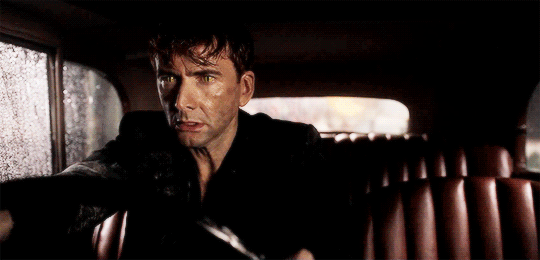
(Minor Good Omens S2 Spoilers)
As someone who’s endured my own Trauma and dealt with the resulting PTSD, watching Crowley’s journey from a joyful, silly, and entirely innocent angel to a withdrawn, lonely, hyper-vigilant demon as a result of the Fall both shattered my heart and confronted me with the fact of myself, and I’d like to talk about it.
When you* experience Trauma, you experience an existential disorientation and a profound sense of grief over the world you thought you knew–one where you were safe and nothing bad had ever happened to you. “Innocence died screaming,” and all that.
You're also therefore mourning the loss of who you were, and struggling to make sense of who you are now. Which is why this conversation is so gut-wrenching:
“I know you.”
“You do not know me.”
“I knew the angel you were.”
“The angel you knew is not me.”
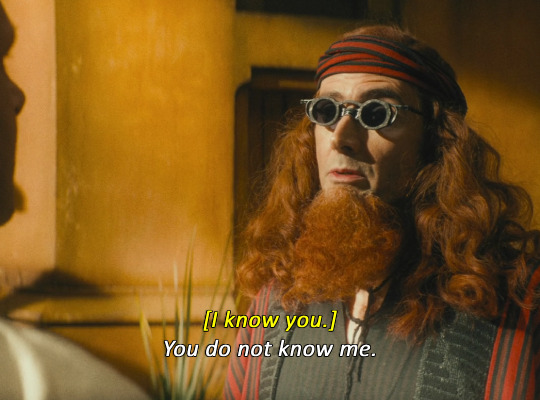
This dialogue admittedly still makes my eyes swim. It’s reminiscent of the many conversations I’ve had with people close to me who knew me Before and After. Not only are you grieving the loss of your own innocence, so are those around you, and it feels like you’re wearing their loved one’s face like a mask.
And then underneath the grief, there’s a river of–what you’ll later discover is misplaced–guilt. They want you to be who you were. Fuck, you also want to be who you were -- to not have experienced what you did -- but you can’t.

And when they catch a glimpse of something that reminds them of Before-You -- because it's not like that you has just up and vanished, you've just changed -- they say things like, “I feel like I have you back!” Like the After-You is a consolation prize, something to be tolerated while they wait for the Before-You to return.
It’s not malicious. They love you. They want you to be happy. But it just serves as a reminder of your loss and suddenly you’re acutely aware of how alone you are with the Thing that hurt you.
After trauma, you’re lonely and you're afraid. But those emotions make you feel quite naked, because both of those things would require you to depend on other people to feel better and, at this point, the thought of doing that is far too scary, so to the world, you’re angry. Thus begins the cyclical self-fulfilling prophecy.
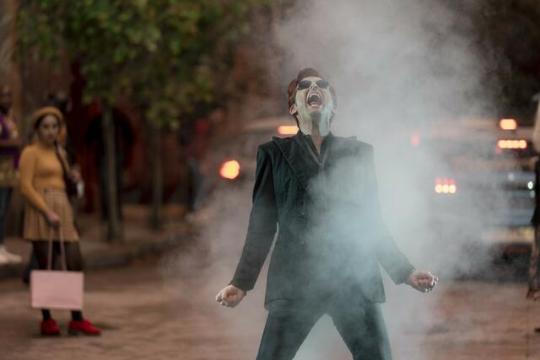
And that cycle goes a bit like this: People see the mistrust and the bitterness and the volatility (the shield that keeps people at an arm's length and helps you feel safe). They don't see the profound sustained fear underneath, the desperate need to feel seen and accepted. And so people pull away.
And that real or perceived abandonment feeds the monster that’s taken up permanent residence in your ribcage and screams at all hours that you’re not worthy of love, that you’re irreparably broken, and you’ll always be alone. And you pull away from the people that love you. And the cycle repeats. And you start to believe all of the bad things about yourself that the monster tells you.

Being confronted with a character who you adore and who you also relate to closely is bittersweet in that it’s both immensely painful, but also offers you an opportunity to interrupt that cycle, to explore a different -- perhaps more forgiving -- lens through which to view yourself. To practice self-compassion by proxy, if you will. After all, we tend to extend far greater empathy and forgiveness to others than we do to ourselves.
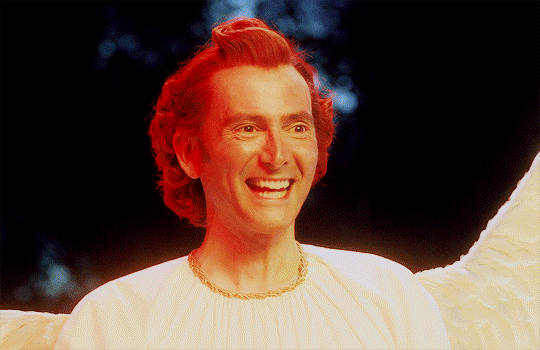
Angel Crowley, "who squeaked and squealed when he was happy; who flailed his arms around and made explosion noises with his mouth to explain nebulas; who preened when told his stars were pretty,” (joycrispy) reminded me a lot of “Angel T,” or rather myself before Trauma.
And Crowley's story is tragic. I was heartbroken and angry for him; I felt the depth of the betrayal he experienced at the hands of someone he loved who he'd believed loved him; I found myself wanting to protect him, to comfort him. Crowley did not deserve what happened to him.
And, over a decade later, I realized that I’d finally accepted that I’d been an innocent, just like Crowley had, and I didn't deserve what happened to me, either.
And -- if you find yourself relating to this post -- neither did you.

Once we can tell ourselves that and actually believe it, we can start to lower the shield. We can allow people closer, including ourselves. We can bring the parts of ourselves we may have hidden away back to the surface. We can soften again. We can truly start to heal.
Crowley, at his core, remains the same. He is still kind, deeply loving, playful, silly, and – against all odds – hopeful. But his trauma has changed him; his innocence is gone.
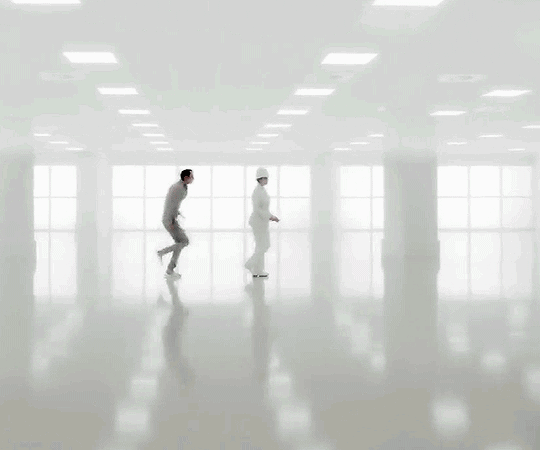
He struggles to trust others; fears abandonment; engages in unhealthy coping mechanisms; finds it easier to prioritize and tend to Aziraphale's needs and desires than his own; and has difficulty expressing his emotions.
But he also gained an abundance of empathy, a deep love for humanity, and a strong sense of justice.
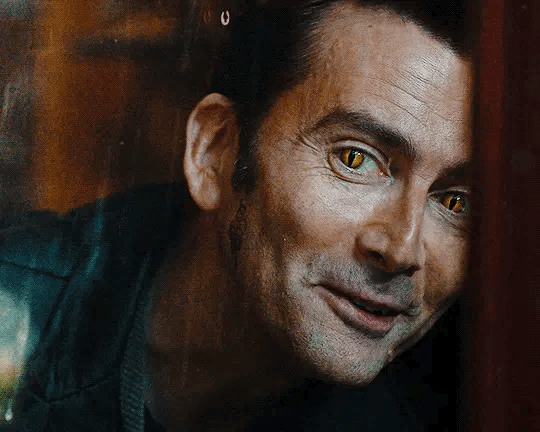
We adore Crowley exactly as he is now; we don't wish for him to be who he was before the Fall. And neither does Aziraphale.
In kind, we won’t be who we were — nor should we try to be — but we can be something new, a different version of ourselves that is equally good, equally worthy, and equally deserving of love.

After over a decade, I think my Trauma wound has mostly healed, as much as Trauma wounds can, anyway; it’s a dull ache rather than an acute pain. Yet Crowley's story assuaged that remaining hurt like a salve I hadn’t realized I needed.
So thank you to @neil-gaiman for giving us such a beautiful story, and to David Tennant, Michael Sheen, and the rest of the cast and crew who bring the characters we love to life on screen.
Good Omens truly is a gift. May it continue to inspire us to offer kindness and love to ourselves and one another. 🖤
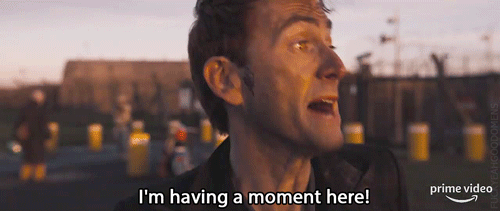
* I am aware that I say “you” when I should use the singular first-person “I,” but I still struggle with this when talking about my own trauma. So I’m using “you” and you, reader, will deal with it x
#good omens#good omens season two#good omens 2 spoilers#aziraphale x crowley#anthony j crowley#angel crowley#anthony crowley#crowley#crowley good omens#good omens crowley#crowley trauma#gos2spoilers#go s2#go season 2#good omens 2#aziracrow#david tennant#good omens character analysis
2K notes
·
View notes
Text
while I was looking for gabriels in the intro, I noticed this redheaded person w dark clothing and lighthaired person w light clothing that appear to kiss in the theatre:
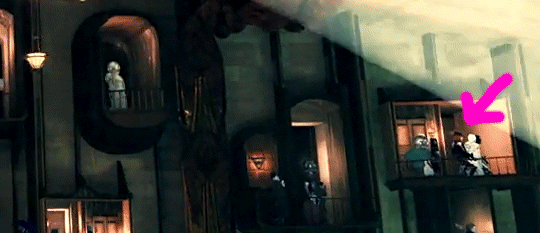
i'm making this about the 1941 kiss theory
---
edit oct 7: a few kind people have mentioned that they remember a post from the official good omens account (possibly on twitter) that said the two people kissing are War & Pollution, and the shadow beside them is Famine. (If you have the link please send it this way! I have done a fair bit of searching but with no luck and it's haunting me bc it must be real but i can't find it)
@0owhatsamsays also pointed out that in the X-Ray bonus video "Title Sequence Easter Eggs" Peter Anderson says there are specific characters from season 1 in the highlighted boxes, and as you can see, the kissing booth (top level, far right) is one with a little trail of stars coming off of it.

#oct 7: on the other hand *puts tinfoil hat back on* A&C were both in season 1 and maybe the W&P post is a mandela effect thing#if anyone has clearer zoomed in pics or has more info to add please enlighten me i missed all the intro analysis on here before s2 came out#good omens intro#1941 go#good omens#a nightingale sang in berkeley square#if i decide this is them then does this mean they kissed in every episode
3K notes
·
View notes
Text
Mr Brown's Ensemble at the Ball
I think this officially marks the moment I've moved from obsessed to completely unhinged. It was only a matter of time. Welcome one and all! Here I loose my mind over the fact that Mr Brown is seen revived in line for the coffee shop wearing his outfit from the Dirty Donkey, NOT his outfit from the ball. But to back up, let's start here:
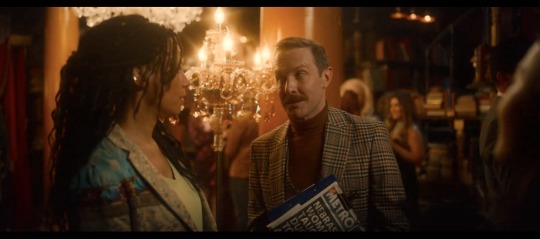
There's already been theories about how Mr Brown's outfit at the Whickber’s Street's Ballroom Meeting resembles Crowley's from when they met at the pub because Mr Brown has a pash on Aziraphale (also infamously blogged about here). Just as a reminder (in case anyone could forget) I'm referring to this outfit...
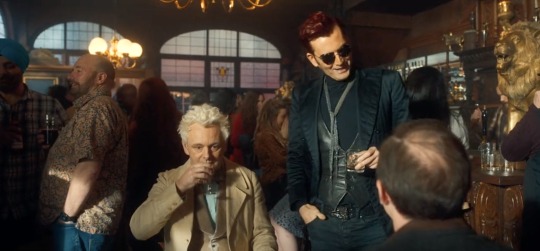
And the fact that Mr Brown shows up at the ball in a turtleneck and vest and jacket much like we see above, however with the vest and jacket in tartan that looks suspiciously similar to dear Mr Fell's bowtie.
I had headcanoned that Mr Brown dressed himself like this at the ball on purpose to catch Aziraphale's eye, but upon latest rewatch I caught this:
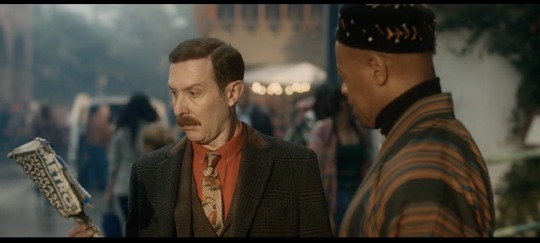
The next morning, Crowley brings Mr Brown back wearing the exact same outfit that he was wearing from the other day at the Dirty Donkey:
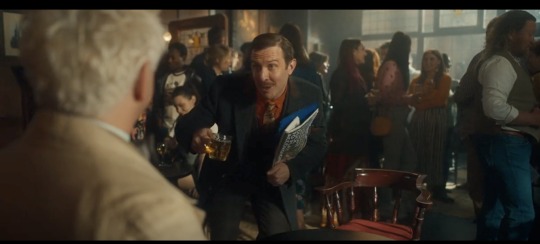
Aaaand this is where I completely lose the last shred of my sanity to this show. Does this mean
Crowley noticed Mr Brown dressing like him and did not care for it and deliberately brought him back in the outfit he'd seen him in before??
The outfit was miracled, and when Crowley brought Mr Brown back from the dead (have we confirmed officially that he died? I can't remember) or from whenever he’d been in the demon’s clutches, he brought him back in his pre-miracled outfit, either on purpose or because the miracled outfit had disappeared upon death/whatever happened to him?
Furthermore, if Aziraphale is miracling the outfits, then he miracled Mr Brown's ballroom ensemble to both look like Crowley's usual outfit AND complement his bowtie?!? SCANDAL!!! Jk, we all know Aziraphale only has eyes for Crowley which leads me to speculate that...
The ballroom outfits were not chosen by Aziraphale, but instead his magic allowed each person to create their own outfit of choice from their subconscious/imagination that would make the event feel more special or perhaps more romantic for them. Has anyone else done a meta about this already? I only remember reading one getting into lapels and allegiances from the ball outfits. However…
If his outfit was miracled and he was revived in the pre-miracled outfit, it seems odd that Mr Brown would have been wearing the exact same outfit from a few days ago. I don't think we've seen any of the other Whickbar street characters wearing the same outfit on a different day, although there are a potentially suspicious amount of extras that do. Does this costume repeat have anything to do with the extras wandering around in the same outfits? Otherwise…
This brings me back to the theory that Crowley made a choice to revive Mr Brown in what he had previously seen him wearing regardless of what he had gone to the meeting in. Maybe because his memory of the previous night was faulty? Or, going back to option #1, he simply did not care for Mr Brown stealing his and Aziraphale’s looks.

For those still reading, let it not be said that I left any stone unturned. Here is Mr Brown entering the bookshop. This is shot in what seems to be the exact same way both Nina's and Mrs Sandwich's entrances are shot, where we see each of them already wearing the changed outfit from the first glimpse we get of them standing outside the door.
One could extrapolate from this that his outfit was changed like Nina's and Mrs Sandwich's, but we don't actually see him walking up to the bookshop beforehand, so I couldn't definitively say from his entrance alone if he came to the meeting dressed this way or if this is his miracled ensemble.
Thanks for joining me on this unhinged adventure!
#good omens meta#losing my mind#yes I have made very few original posts and yet two are them are now about mr brown#what has he done to me?#unhinged meta#good omens theories#good omens s2 analysis#good omens s2e5#good omens clues#good omens costumes#good omens s2#mr brown of browns world of carpets#whickber street shopkeepers and street traders association
65 notes
·
View notes
Text
Everything Is Meant (long S2 analysis, part 2)
Part one here
Okay, so that's how I think the pre-creation scene and Gabriel's arc connect to Aziraphale's choice. I also think the ineffable bureaucracy speedrun exists to prove totally different things to Aziraphale and Crowley: Aziraphale loves that they can love each other but notes they have to run away to be together; Crowley sees this and immediately thinks "hey, we can do that too!", forgetting that running away is not a solution Aziraphale has ever been interested in. It's the mentality of an individualist vs a group-oriented mind, and neither of them is necessarily wrong, it's just that their priorities are different and they HAVE TO TALK ABOUT IT, which they don't.
Continued analysis under the cut:
3. Let's take the Job minisode. Why include it? We already mentioned that it proves Aziraphale remembers Crowley as an angel, since he mentions it. And he believes Crowley is the same person he always was, and that he doesn't want to harm Job's crops or animals or children. Crowley tries to convince him he's a Big Bad Demon who is all in on this assignment, but fails utterly to kill even a single goat, soooo... Aziraphale comes to the conclusion that he knows what Crowley wants. Alert! Alert! This is a big problem! Crowley says, "What do you know about what I want?" Aziraphale: "I know you." Crowley: "You do not know me." But because Aziraphale got it right this time, he goes ahead assuming he'll always get it right, which is a crucial failure when it comes to the final reckoning. He doesn't ever ASK Crowley what he wants, he just assumes. When you assume you know what someone wants, you usually assume their priorities align with yours... he couldn't be more wrong about that. The Job minisode sets up this dynamic for them, and they never really manage to change it.
The other thing happens at the end of the minisode. Crowley acknowledges two crucial points: 1) he's lonely ("But you said it wasn't!" "I'm a demon. I lied"), 2) he doesn't think Aziraphale would like Hell. Aziraphale DOESN'T like Hell. Aziraphale hates Hell for what they've done to Crowley. He doesn't see Heaven as innocent or benign, but importantly, Heaven has never tried to hurt Crowley directly. They never threatened his safety. They never tortured him (as it's heavily implied that Hell did). Fast forward to the last ten mins of season 2: Aziraphale excited to tell Crowley that he can be an angel again BECAUSE: he never has to go back to Hell. They can never hurt him again, not the way they did before. And he doesn't have to be lonely anymore.
Last point before I leave Job: Crowley has the chance to cause Aziraphale to Fall, here, probably. ("I lied to Heaven to thwart the will of God!" "You did, but I'm not going to tell anybody. Are you? ...good, then nothing has to change.") He doesn't take it. He doesn't want Aziraphale to be a demon. He loves Aziraphale as he is. "Angel" as an affectionate. Aziraphale certainly doesn't use "demon" as a pet name for Crowley. I think they set up this scene to contrast the final one, and show how deeply hurt Crowley is that Aziraphale suggest he change.
4. Moving on to Victorian Scotland. This one confused me at first. I was delighted that they brought back the "the lower you start the more opportunity you have to rise" dialogue from the book, but apart from that I didn't really see the point of it. It seems like the statue of Gabriel and the fact that he and Beelz ended up at that pub in the present were more or less coincidental.
The point, I think, is actually not the girl, but the doctor. He's a person who is trying to do good by working in a system that's deeply flawed, and engaging in questionable moral practices for the greater good. (Cadaver dissection is still an essential part of medical school. You need dead bodies to understand living ones.) He shows Aziraphale a tumor he removed from a child who died, and Aziraphale clutches it to his chest. The camera zooms in and lingers to tell us that this is a guardian through and through. He wants to protect people. He wants to do good with every fiber of his being.
To Crowley, it's enough to just "be an us" with Aziraphale. He doesn't really want anything more than that. That's an issue! For one thing, it fosters unhealthy codependency, and for another, Aziraphale would never be happy without the opportunity to help and protect people. It's an essential part of who he is. Metatron knows that, and he plays Aziraphale like a fiddle. The doctor showed Aziraphale that you can make a difference even in systems that are flawed, and even if you have to do things you'd rather not do. Aziraphale doesn't want to go back to Heaven, but he truly thinks he can change things; thinks he can be a guardian with some real power. In his mind, that's the right thing to do.
Last thing that happens in Scotland: Crowley saves a soul from Hell, arguably, by preventing a suicide. He gets in Big Trouble. Whatever happened to him downstairs resulted in him coming back up, leaning on a cane, and asking Aziraphale to give him holy water. Go back and watch that scene knowing what we know now about the Victorian minisode. Ask yourself how Aziraphale must have felt. He likely blamed himself for what happened, because if he hadn't meddled then they never would have been there in the first place. He knew where Crowley was, and why he was there, and he had to sit with that knowledge for years. He desperately wants Crowley to be safe; is perfectly willing to push him away to keep him safe-- which is what he does do, the minute Crowley gets back.
Now think again about what Metatron offered him. A chance to keep Crowley safe forever. He'd never be harmed again. Aziraphale is going to take that offer, no matter what else is asked of him. He's shown over and over again that he'll sacrifice his own happiness to make sure nothing happens to Crowley. And he'll do it without talking to Crowley about it first, because he is a moron who doesn't know how to use his words. Leading Crowley to assume that Aziraphale doesn't love him. The idiot angel is doing it all out of love, but because he doesn't make himself clear Crowley doesn't know that.
Part 3: Maggie and Nina, and their roles as mirror couple/ Greek chorus!
#good omens#good omens season 2#good omens s2#good omens s2 spoilers#good omens meta#aziraphale#crowley#everything is meant#good omens analysis#part 3 tomorrow
2K notes
·
View notes
Text
Defining Ineffable Love (or, Aziracrow Learn the Rules of Romance)
(In response to this ask about ineffables and asexuality)
One of the major threads this season was Aziraphale and Crowley asking themselves what exactly is their relationship. Not what it is in terms of how much they love each other. (That's a given.) But what it is in terms of the human implications of their love.
Crowley and Aziraphale definitely come at the relationship with different perspectives, in terms of what they’re willing to admit to the relationship being. I don’t think we can entirely interpret it in human terms.
–David Tennant (source)
For 6000 years, they’ve never put a name on their relationship. They didn’t, because they’re inhuman, genderless, sexless beings and they didn’t grow up (as it were) with labels. And even when they did learn them, they couldn’t say it was love, because admitting that was a death sentence.
All of Aziraphale’s heart eyes and pining could live comfortably in his mind if he never admitted what that said about him as an angel (trauma compartmentalization). Crowley tries desperately to be cruel and nasty to add white noise around the blatant reality of his constant loyalty to Aziraphale. If you don’t put a word to it, it’s not real and they can’t punish you.
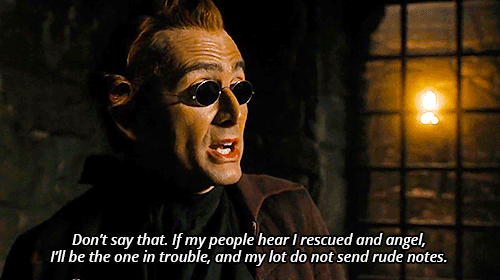
After the Not-pocalypse, for all rights and purposes, Aziraphale and Crowley chose humanity as their identity. We see Aziraphale “playing house” in various human roles (as a landlord, a private eye, a magician).
We even see Crowley intentionally taking on human behavior to handle emotional issues: “Just breathe, that’s what humans do.” They’re slowly and intentionally enculturating themselves into the world they want to belong––earth.
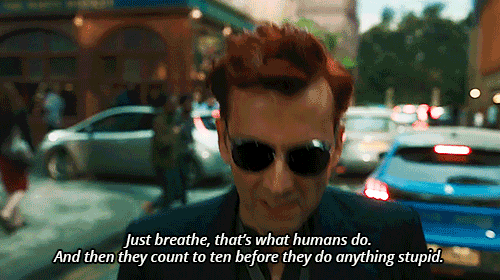
Yet it’s setting up Maggie and Nina that makes Aziraphale and Crowley start thinking about their relationship as a human construct.
Because fundamentally, Aziraphale and Crowley are not human. Like Neil Gaiman tells us constantly, they can’t be defined in human terms when it comes to gender and sexuality. They can shift and move through each and any of those markers at will, purely for the pleasure of the thing: “angels are sexless unless they really want to make an effort.”
IMO that makes them originally asexual, in the sense they were created without the need for sex. And it makes them fundamentally transgender and genderfluid, because while on earth, their sexless, eldritch spiritual bodies take on human, gendered forms and clothing. What gender (and sexuality) they identify with while on earth varies through the eras. Crowley definitely has a fluid gender identity, while Aziraphale appears to have settled on gay man (aka THE southern pansy) for his internal typology (although all of these identities are subject to change).
In the midst of all this fluidity, it’s no wonder Aziraphale and Crowley haven’t thought of their relationship in human terms before. There’s just so much different in them and their bodies than what they see in humanity. And there are no books and songs that show the kind of love they have, in the malleable, sexless bodies they have, with the background they have; it’s all ineffable.
Aziraphale and Crowley didn’t start out thinking they were in a romantic relationship. Whatever feelings they had were long repressed, redefined, and shuttled away. But they did love each other, without question. And it was that love which scared them, because it was bigger than anything they saw among humans, a love that was beautiful and blasphemous and unfathomable.
Kinda like what David Duchovny said about Mulder and Scully in The X-Files, “I don’t know if they’re in love. In a way, their relationship is deeper than that, because they cannot live without each other.”
Now take this profound, ineffable love and drop it into the little boxes and labels human culture has created for itself.
Full disclosure: I’m an asexual demiromantic person in a queerplatonic relationship, so I’ve done a fair bit of research on what romance is and how the rituals of romance are, in many ways, social inventions that vary from culture to culture. There’s love and then there’s romance, and they don’t always overlap. So my interpretation of Aziraphale and Crowley comes through this lens and the fact that Neil Gaiman has affirmed the validity of an ace-spec reading on our ineffables.
Which brings me back to my thesis: That only now are Aziraphale and Crowley thinking of themselves as a romantic couple, precisely because they are interfacing with humans and taking on their social rules.
I like this one asexual person’s description of their experience, which feels very much like our ineffables (from a very good article, I def recommend):
If there is a border between friendship and romance, then in my internal landscape, it goes right through a misty forest where no one has ever bothered to place signs....
Neither of us had intended to start anything even vaguely romantic, but the activities we did and the intense kind of immediate connection we had was coded as romantic in our culture.
That’s what Crowley realizes when Nina confronts him about his relationship to Aziraphale.
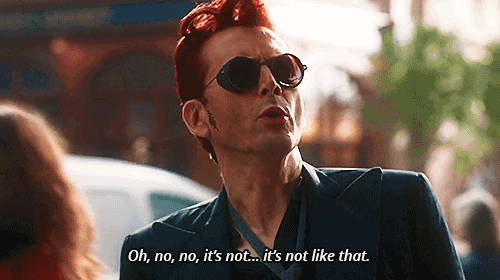
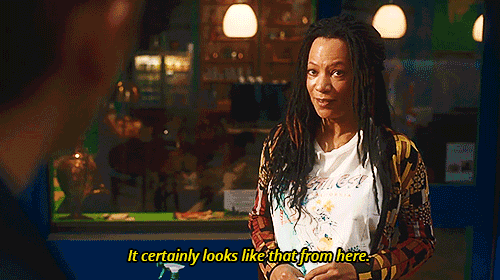
“It looks like that from here.” What Crowley and Aziraphale share is beyond definition, but Nina cannot imagine the anything beyond the human labels she was taught. The tragedy of an everlasting love is that it can only be conveyed properly to other humans if it is cast in such small human words––partner, boyfriend, husband.
Because when Crowley denied those human roles for Aziraphale, Nina slid down the path of thinking Aziraphale was just his “bit on the side,” because there were no labels left she could imagine for them. If you don’t put a word to it, it’s not real.
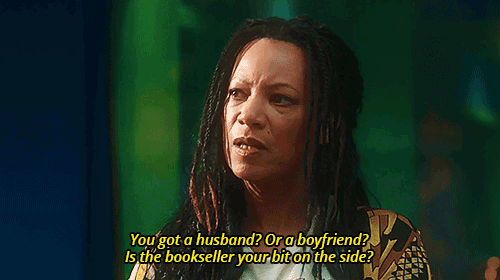
That’s the purpose of labels, to culturally validate a person's identity. Labels, of course, DO NOT create reality; people's experiences are always real, in all their varied ineffability. But labels allow a space for culture (ie other humans and political and legal society) to recognize formally your lived reality.
So Crowley started really thinking about him and Aziraphale, about the ineffable love between them and realized that in human terms, those would be the things he’d call Aziraphale, because those were the words that gave Aziraphale that place of importance in his life.
But with that realization comes all the human trappings and behavioral patterns around those words (the candlelit dinners, dramatic rescues, drinks at the Ritz, etc.) which Crowley had never thought of before, and yet… maybe romance is what he and Aziraphale have been doing all along.
That’s why this season centered so much around Aziraphale and Crowley using cultural artifacts (film and literature) to understand romance, because romance is so deeply socially-defined.
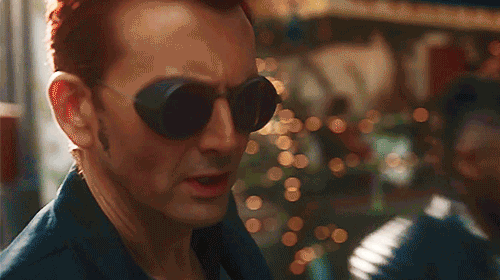
Aziraphale himself has been leaning hard into the romantic social cues (he’s more well-read in the cultural trappings of romance than Crowley is), especially post-Blitz. But when he watches Maggie and Nina dancing, he works up the courage to do something with Crowley that’s even more explicitly loaded as “traditionally romantic” than anything he’s done up to that point.
Because while risking their lives for each other and defying everything for each other is love in its purest form, dancing (specifically in Jane Austen’s world) is a public performance coded for potential marriage partners. It's an intimate ritual of the entire body. (And in British slang, dancing has been used as a euphemism for sex.)
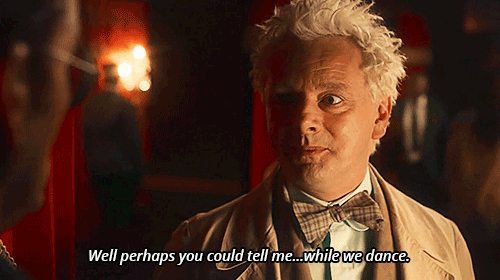
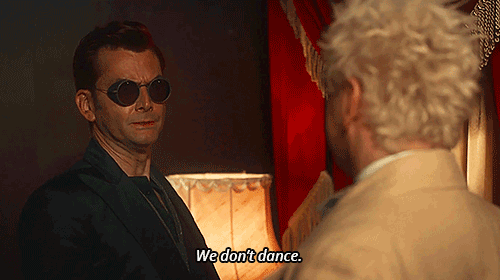
Crowley's "We don't dance" is really telling, because it shows Crowley’s awareness of the unknowable devotion between them vs the human roles Aziraphale is asking him to fill, specifically its physical aspects. Aziraphale is asking to make their relationship more public, more physically explicit, more coded as romantic in a setting specifically intended to couple individuals.
While Maggie and Nina inspired Aziraphale to progress their relationship into a publicly physical direction, Maggie and Nina inspired Crowley to think of the emotional implications of their human roles: the commitment, security, and monogamy of a husband, a partner, an us.
That’s what he decides after Maggie and Nina confront him in the end. “You never say what you’re really thinking.” He wants to codify his relationship so they each become responsible to one another. Aziraphale has always been his soulmate, the one he could always rely on. But he wants to place a word and a role to their love that will bring with it Aziraphale’s commitment and dedication to him.
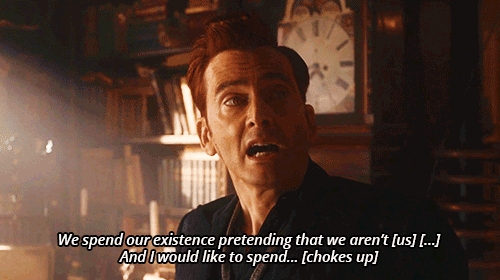
And that's another reason why Crowley kisses Aziraphale, because he knows Aziraphale was willing to make their relationship physical, and he wants that, too. To consummate this bond in the way humans do.
But Crowley doesn’t really know how to kiss; he’s not as worldly as he makes out to be. (It’s Aziraphale who owns the gun, and Crowley who’s never fired one.) He uses the kiss as a tool to get across to Aziraphale what he wants for them, in the physical language Aziraphale has been using, because "one fabulous kiss and we're good," right?
But it doesn’t work, because real life and real emotions don’t work like that; life and love don’t follow a script, despite the novels and plays and songs.
Aziraphale and Crowley spent this entire season trying to figure out what their relationship is and what they wanted out of it, trying to make sense of the unfathomable thing they share and the human implications of it, and not quite landing on the same page.
Part 2 of this Analysis, covering a correction in Crowley’s statement (“You don’t dance”) and the further implications of dancing/sex.
#please see the part 2 listed at the end for an analysis Crowley’s “you don’t dance#good omens#good omens 2#ineffable husbands#go s2 meta#go meta#good omens meta#queer#asexuality#asexual#aromantic#genderfluid#gos2spoilers#go s2#good omens 2 meta#ineffable romance#*mine#*mymeta
2K notes
·
View notes
Text
6 months on it still thinking about how much of a shock that kiss must’ve been to Aziraphale.
The way Crowley steers his cooperation around really gave Aziraphale no warning at all. I was thinking about the development of their body language and it’s interesting to me so have an analysis under the cut.
Crowleys body language doesn’t change all that much over the course of their history. After their initial meetings as angels then in Eden, Crowleys already leaning in, orbiting and slinking around in quite a comfortable, familiar way. He tends to angle his body towards Aziraphale and stands quite close to him. He shows no sign of being fearful or uncomfortable. He quite happily moves in and around Aziraphales personal space without a care in the world even when they hardly knew each other yet.
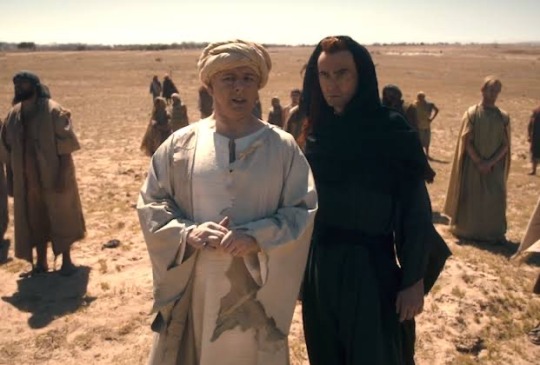

Aziraphale however starts out looking guarded and unsure. He often stands facing forward while talking to Crowley sideways.
As we go through history Aziraphale becomes more comfortable. He opens up, starts to angle his body more towards Crowley, stops guarding with his hands and moves into Crowleys space on his own. And he starts to initiate physical contact where it’s not even necessary.
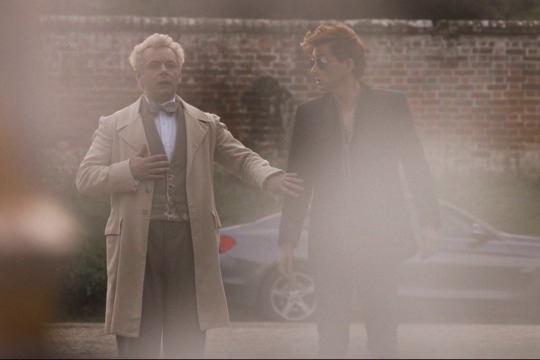


But the only times I can think of Crowley initiating physical contact before the kiss are ones that could easily be written off as just friendly or something else like
The wall push (which was aggressive)
The magic shop handshake is practical for sealing the deal
The handhold for the swap (mutual initiation, also practical we assume)
Sitting on the arm of the chair and kinda sorta leaning on Aziraphale when Muriel turns up
Crowley also tends to reject Aziraphales touch by removing himself from it like in the 1800’s, dodging with some roundabout footwork or leaning away. With moments like the pub or the shoulder touch he doesn’t have much of a visible reaction. Granted his eyes are hidden but Aziraphale probably thinks he just doesn’t like being touched. And yes, Neil said they like holding hands, but do they know the other likes holding hands?
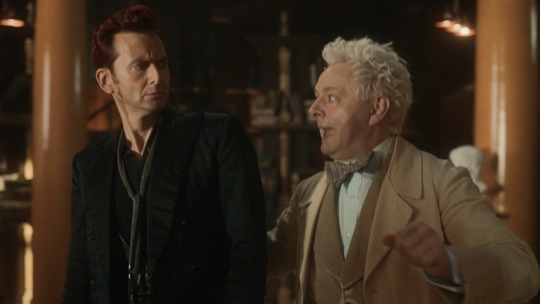
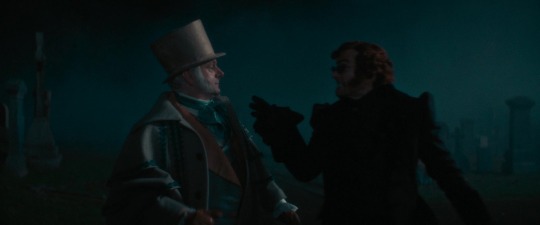
And I can hear you say ok then why does Crowley always put himself within touching distance if he don’t wanna be touched? Yeah, he does, but from Aziraphales perspective Crowley has always done this. He’s always been standing close or leaning in. It’s just how he is. Aziraphale is the one who’s changed. He’s become walking megaphone just blasting ‘please hold my hand before I discorporate on the spot pleasepleaselpleaseplease…’
Aziraphale is clearly a physical touch being. He reaches for Crowley in the most stressful or emotionally charged moments. And I think he has been holding back (we can see that on his face) but there’s times where he seems to stop himself mid motion from touching Crowley. Such as after Gabriels appearance and Az is trying to keep Crowley calm
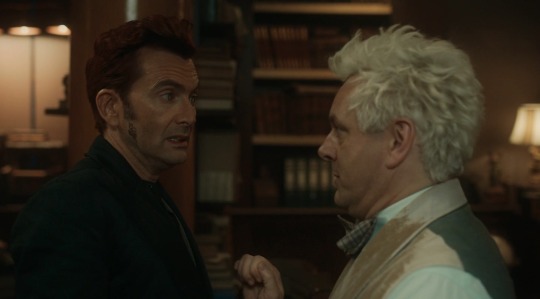
When Crowley says he’s going to take the humans out
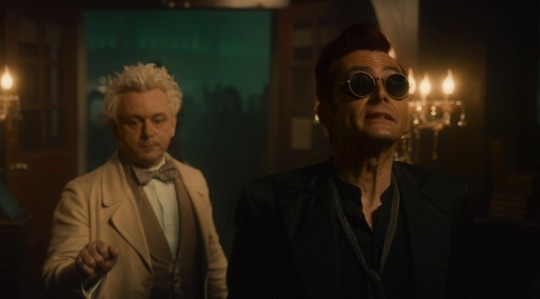
And when Crowley goes to take Maggie and Nina out of the bookstore when Heaven and Hell are there. There is a safety element here as it’d be unwise for him to show his affection with Heaven or Hell around but Aziraphales first instinct is to reach for him. But Crowley just gets out of the way like he does it all the time. It’s another dance they do, Aziraphale pursues with physical affection, Crowley avoids. And Aziraphale doesn’t want to cross boundaries he’s perceiving Crowley to be putting up around physical affection so he’s holding it back.
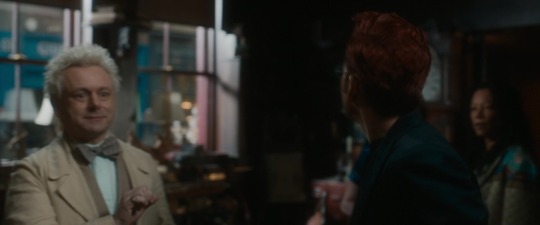
And I think all that is part of the reason Aziraphale looks angry after the kiss. He’s possibly thinking (among many other things) that Crowley has rejected or ignored his physical affection all this time, making Aziraphale think he didn’t want it when he did. And that would be a painful thing to realise when you thought you yearned alone.
So I don’t blame Aziraphale for being upset when he gets this sudden enormous dose of physical contact out of the blue. He had no warning. On the contrary, Crowleys been acting like a big, prickly, demonic cactus. And it would’ve been endlessly confusing to be kissed after years believing the want for even the lightest of touches wasn’t reciprocated.
#good omens#crowley#aziracrow#ineffable husbands#aziraphale#crowly x aziraphale#good omens s2#good omens season 2#good omens analysis#good omens meta
787 notes
·
View notes
Text
I remember in Good Omens Season 1 how I laughed at the fact that Crowley didn't tell Aziraphale about the hellhound. And how funny it was that neither of them ever told the other about having the same network of people (the witchfinder army).
It was all fun and games till Good Omens Season 2 opened my eyes and made me realize they, in fact, have problems with communication.
Nina was right, they don't fcking talk
#I am unwell#all fun and games till they literally divorce over it#good omens#good omens 2#ineffable husbands#good omens s2#good omens 2 spoilers#ineffable spouses#good omens season 2#go2#neil gaiman#ineffable partners#good omens analysis#ineffable divorce
1K notes
·
View notes